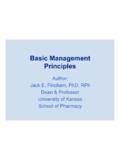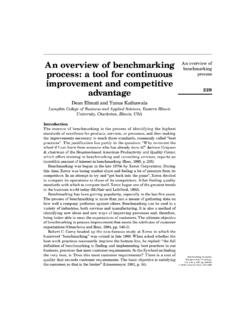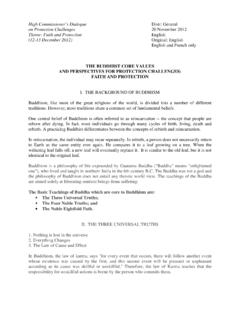Transcription of Five Essential Skills for Every Undergraduate Researcher
1 16 Council on Undergraduate ResearchSpRing 2013 Volume 33, number 3 FocusCUR [B]eing my research problem, it was up to me to solve..The crucial lesson was that the scope of things I didn t know wasn t merely vast; it was, for all practi-cal purposes, infinite. That realization, instead of being discouraging, was liberating. If our ignorance is infinite, the only possible course of action is to muddle through as best we can (Schwartz 2008, 1771).Research is hardly easy. As Martin Schwartz points out in his 2008 essay The Importance of Stupidity in Scientific Research, solving research problems requires us to immerse ourselves in the unknown.
2 However intimidating it may be to overcome this infinite amount of ignorance, we believe there is a special set of traits that will equip an under-graduate Researcher to successfully solve research problems. Creativity, judgment, communication, organization, and persistence are all equally important Skills to make the leap from gaining knowledge from others discoveries to making discoveries on your own. Having and honing these Skills , Skills that encompass Every level of research in Every disci-pline, are key to an Undergraduate developing the founda-tion for a successful career in research.
3 As a group of under-graduate researchers and mentors, we want to motivate students to solve problems and make discoveries, and to start a discussion on how to forge the right path for each student toward research success. Following is our list of key is difficult to find a definition of Undergraduate research that does not include a reference to creativity or that does not contain terms such as original, authentic, or unique. Clearly, then, creativity is a constant for the undergradu-ate research process.
4 In an article by Jeffrey M. Osborn, dean of The College of New Jersey, and Kerry K. Karukstis, professor of chemistry at Harvey Mudd College, originality is said to be a common thread that runs through Every Undergraduate research activity on campus. Creativity and originality go hand in hand. Creativity is the ability to transcend mainstream ideas, and creativity all but requires originality. It is no surprise then that originality is so per-vasive throughout the college or university campus.
5 The Council of Undergraduate Research provides a universally applicable definition that describes Undergraduate research as an inquiry or investigation conducted by an undergradu-Five Essential Skills for Every Undergraduate Researcherate student that makes an original, intellectual, or creative contribution to the discipline (Wenzel 1997, 2000). All researchers, not just undergraduates, require creative think-ing and process development to build upon today s knowl-edge. Creativity is an Essential trait that Undergraduate researchers should seek to develop and utilize within their research first step in research is developing a topic or a plan for exploring a problem, and creativity is fundamental to this effort.
6 As members of our university s Student Undergraduate Research Council, we constantly come across prospective Undergraduate researchers who don t know where to begin. Students in all disciplines are unsure, even lost, as to how they should start deciding upon a research topic. We encour-age students to research their discipline extensively, to find out what has and has not been studied, and to attempt to find a topic in which they are genuinely interested. Even by studying research outside their own disciplines, budding researchers can use the creative process to make new connec-tions, pushing the envelope of what is possible in discovery.
7 Ingenuity, uniqueness, and, most importantly, creativity are all Skills that need to be applied in creating that standout research concept. Students who are still hesitant about delving into the cre-ative process of Undergraduate research as part of an inde-pendent endeavor should seek to develop their creativity by participating in ongoing research and watching how a faculty mentor or graduate student employs creativity in conducting that research. During this time, Undergraduate researchers can learn how to think creatively within the context of their field and possibly discover a topic of interest that will provide them with an independent, unique research opportunity.
8 But students should not limit themselves to the expertise of their faculty mentors. To be a true Researcher , undergraduates should strive to reach beyond their own disciplines, either into closely related disciplines or those completely unrelated to their own, for possible ideas. JudgmentA quite specific sort of judgment is critical when participat-ing in the world of research. Just as the mentor may exercise judgment in selecting a mentee, an Undergraduate Researcher should likewise evaluate and choose a mentor who will help the Researcher to grow in the best possible way.
9 Personality, Adrienne Showman, Linh Anh Cat, Jacquelyn Cook, natalie Holloway, and Tyler Wittman, University of Central Florida on Undergraduate researChuarterlytemperament, and style of research are all factors to consider when choosing a mentor. Another important aspect of judg-ment is recognizing when to ask for help in solving prob-lems. To gain the most experience from research, students must make a calculation between knowing when to ask for help when they encounter an obstacle or possibly lose time by deciding to tackle the problem on their own.
10 The progress of the research and perhaps the opportunity for the project to be finished successfully may rest on what they , student researchers should not over-utilize a men-tor s valuable time; instead, they should strike a balance between independence and seeking assistance. As under-graduate researchers move on to higher-level studies and professional careers, this ability to discern their own and others needs, and thus make judgments in a fluid environ-ment, must become automatic and unconscious, so they do not waste precious time and energy weighing the pros and cons of Every single researchers also should consider and study the importance of good judgment as it applies to ethical dilemmas in research.





